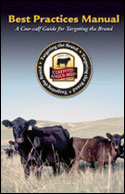TVMDL Confirms Anthrax Case
Sample tissue submitted to the Texas Veterinary Medical Diagnostic Laboratory (TVMDL) has tested positive for anthrax in a central Texas beef cattle herd, according to agency officials. In late March, the Texas Animal Health Commission (TAHC) confirmed the anthrax case on a ranch in Hill County near Whitney, 30 miles north of Waco. A veterinarian submitted the tissue samples to the diagnostic laboratory in College Station.
"It's not unheard of, but somewhat unusual (for anthrax to be discovered in Central Texas)," said Amy Swinford, head of diagnostic bacteriology for the TVMDL.
The laboratory conducted a series of tests to confirm the identity of the bacteria isolated from the cow's spleen, Swinford said.
"While the organism can be cultured from infected tissues, the preferred specimen is a blood sample, which can be collected without opening the carcass and potentially contaminating the surrounding soil," she said.
Through the years, the laboratory has confirmed cases of anthrax as early as March and as late as December, although the disease typically is discovered during summertime in the state, according to Swinford. Most recent cases have been primarily in Southwest Texas, which is the endemic area for anthrax in the state.
Animals will be restricted from movement and vaccinated, according to animal health officials.
The anthrax spores live in the soil and can continue to be a threat to livestock if not vaccinated, Swinford said. Recent dry, warm weather likely created a favorable environment for the spores to form.
"Also, when you have a heavy rain, spores that may have been deep within the soil can float to the surface," Swinford said. "They are then more easily ingested by livestock as animals graze the forage; the spores enter into their systems, germinate and cause disease."
"I give credit to great people here in this laboratory," she said. "Myself and my three senior technicians are on call to do this diagnostic work. Upon diagnosis of a reportable disease (such as anthrax), we notify TVMDL directors immediately, who in turn notify state health and Texas Animal Health Commission directors."
"This is another example of the laboratory providing early detection on diseases of high consequence and providing services to protect our livestock industry," said Tammy Beckham, TVMDL director.
 "We work closely with the industries and veterinarians across the state to provide timely, accurate diagnosis. In the case of infectious diseases such as anthrax, the time to diagnosis is critical for control and containment. Our staff is among the elite in their field and, as such, works diligently to protect the agricultural, companion animal and public health sectors of Texas and the nation."
"We work closely with the industries and veterinarians across the state to provide timely, accurate diagnosis. In the case of infectious diseases such as anthrax, the time to diagnosis is critical for control and containment. Our staff is among the elite in their field and, as such, works diligently to protect the agricultural, companion animal and public health sectors of Texas and the nation."
For more information on anthrax or the TVMDL, visit http://tvmdl.tamu.edu/. Information about anthrax is also available on the TAHC website at http://www.tahc.state.tx.us or call 1-800-550-8242.
[Click here to go to the top of the page.]










